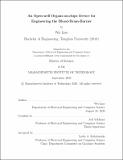An open-well organs-on-chips device for engineering the blood-brain-barrier
Author(s)
Liao, Wei,S.M.Massachusetts Institute of Technology.
Download1227278359-MIT.pdf (9.801Mb)
Alternative title
Open-well OOC device for engineering the BBB
Other Contributors
Massachusetts Institute of Technology. Department of Electrical Engineering and Computer Science.
Advisor
Joel Voldman.
Terms of use
Metadata
Show full item recordAbstract
Microfluidic Organs-on-chips (OOC) technology hold great promise for advancing the understanding of blood-brain-barrier (BBB) physiology and investigating BBB dysfunction in central nervous system diseases. It can provide high physiological relevance through engineering a range of system parameters. However, the resulting system can be hard to operate, have inadequate robustness and limited throughput, which is a major challenge that must be overcome before its widespread acceptance by both basic and applied research area. This thesis proposed a system which is aimed at solving this particular challenge of microfluidic OOC systems by having the open-well design to ease the process of liquid handling and allows facile assay while maintaining the high biological sophistication it can model for the BBB (microarchitecture, vascular perfusion etc.). A simulation model was developed to optimize the device design and predict the distribution of one vital chemical stimulating signal for vasculogenesis -- Vascular Endothelial Growth Factor (VEGF), where distinctive isoform-specific transport profiles were found due to the binding reaction with the extracellular matrix (ECM). Experimental validation was performed to examine the ECM-binding capability for a specific isoform, which yielded consistent results with the simulation. Next, preliminary experiments for the proposed system were conducted, which include the vasculogenesis assay using brain endothelial cells derived from induced pluripotent stem cells (iPSCs) and the APTES-mediated polystyrene-PDMS bonding. These two aspects are integral for the next-stage development of the proposed system and the implementation of a multicellular BBB model on this platform. It is anticipated that the proposed system will realize facile, robust and high-throughput assays thus wider adoption in biology research area.
Description
Thesis: S.M., Massachusetts Institute of Technology, Department of Electrical Engineering and Computer Science, September, 2020 Cataloged from student-submitted PDF version of thesis. Includes bibliographical references (pages 97-105).
Date issued
2020Department
Massachusetts Institute of Technology. Department of Electrical Engineering and Computer SciencePublisher
Massachusetts Institute of Technology
Keywords
Electrical Engineering and Computer Science.